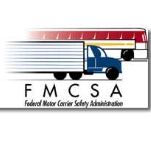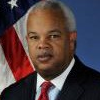The FMCSA was created within the Department of Transportation pursuant to the Motor Carrier Safety Improvement Act (MCSIA) of 1999. The purpose of the MCSIA was to improve the safety of commercial drivers through regulations, stronger enforcement and sanctions. According to the MCSIA, the goal was to reduce the number and severity of large-truck involved collisions.
FMCSA Welcomes Mexican Motor Carriers
- Table of Contents
- Overview
- History
- What it Does
- Where Does the Money Go
- Controversies
- Suggested Reforms
- Comments
- Leave a comment


T.F. Scott Darling III, who has been running the Federal Motor Carrier Safety Administration (FMCSA) since 2014, was nominated on Aug. 5, 2015, by President Barack Obama to be the agency’s permanent administrator.
Darling is from the Boston area and sought to be an urban planner. He attended Clark University, earning a bachelor’s degree in urban government with a minor in geography in 1984. He subsequently earned a master’s in public policy from Tufts and a law degree from Suffolk University.
Between 2001 and 2003, Darling served as the part-time executive director for Freedom House in Dorchester, Massachusetts. In Darling’s work as an attorney, he dealt mainly with transportation, land-use, housing and environmental issues. From 2003 to 2005 he was a staff attorney at Fort Point Associates in Boston, which is an urban planning and environmental consulting firm. He was also the director and staff attorney for the Greater Boston Institute in the Conservation Law Foundation. There he helped organize the Riders Oversight Commission, which gave Boston-area public transit users a voice in how the system is run.
In 2005, Darling went to work for the Massachusetts Bay Transit Authority, initially as an environmental and land-use counsel, as well as its privacy administrator. He was promoted in 2009 to be deputy chief of staff and assistant general counsel for the authority.
Darling went to Washington in 2012 as chief counsel for the FMCSA. He was made acting administrator two years later upon the departure of Administrator Anne Farro. His term as acting administrator ended in March 2015, but Darling continued to run FMCSA as its general counsel.
Darling is married to Alyson Cooke, a counsel to the Senate Environment and Public Works Committee. She formerly worked for then-Senator Joe Biden.
-Steve Straehley
To Learn More
Scott Darling, FMCSA’s Top Lawyer, to Serve as Interim Administrator (by Kevin Jones, Commercial Carrier Journal)

President Obama’s choice to lead the Federal Motor Carrier Safety Administration (FMCSA) has created a firestorm of criticism from labor and safety advocacy groups. FMCSA, which is part of the Department of Transportation, is charged with creating regulations and safety initiatives to be used in cooperation with states, to improve the safety of commercial vehicles, especially trucks. Trucking companies, labor unions representing truckers, and safety-oriented consumer groups are the main constituents seeking to influence FMCSA.
- Latest News
- D.C. Public Schools will Teach all Second-Graders to Ride a Bike
- New Rule in Germany Limits Sales of Sex-Themed E-Books to 10pm to 6am
- What Happened to the 6-Year-Old Tibetan Boy the Chinese Government Kidnapped 20 Years Ago?
- U.S. Ambassador to Turkey Photoshops his Hair Color to Mock Turkish Mayor
- Mystery Artist Calls Attention to Unfixed Potholes by Drawing Penises around Them
The FMCSA was created within the Department of Transportation pursuant to the Motor Carrier Safety Improvement Act (MCSIA) of 1999. The purpose of the MCSIA was to improve the safety of commercial drivers through regulations, stronger enforcement and sanctions. According to the MCSIA, the goal was to reduce the number and severity of large-truck involved collisions.
FMCSA Welcomes Mexican Motor Carriers
Comments


T.F. Scott Darling III, who has been running the Federal Motor Carrier Safety Administration (FMCSA) since 2014, was nominated on Aug. 5, 2015, by President Barack Obama to be the agency’s permanent administrator.
Darling is from the Boston area and sought to be an urban planner. He attended Clark University, earning a bachelor’s degree in urban government with a minor in geography in 1984. He subsequently earned a master’s in public policy from Tufts and a law degree from Suffolk University.
Between 2001 and 2003, Darling served as the part-time executive director for Freedom House in Dorchester, Massachusetts. In Darling’s work as an attorney, he dealt mainly with transportation, land-use, housing and environmental issues. From 2003 to 2005 he was a staff attorney at Fort Point Associates in Boston, which is an urban planning and environmental consulting firm. He was also the director and staff attorney for the Greater Boston Institute in the Conservation Law Foundation. There he helped organize the Riders Oversight Commission, which gave Boston-area public transit users a voice in how the system is run.
In 2005, Darling went to work for the Massachusetts Bay Transit Authority, initially as an environmental and land-use counsel, as well as its privacy administrator. He was promoted in 2009 to be deputy chief of staff and assistant general counsel for the authority.
Darling went to Washington in 2012 as chief counsel for the FMCSA. He was made acting administrator two years later upon the departure of Administrator Anne Farro. His term as acting administrator ended in March 2015, but Darling continued to run FMCSA as its general counsel.
Darling is married to Alyson Cooke, a counsel to the Senate Environment and Public Works Committee. She formerly worked for then-Senator Joe Biden.
-Steve Straehley
To Learn More
Scott Darling, FMCSA’s Top Lawyer, to Serve as Interim Administrator (by Kevin Jones, Commercial Carrier Journal)

President Obama’s choice to lead the Federal Motor Carrier Safety Administration (FMCSA) has created a firestorm of criticism from labor and safety advocacy groups. FMCSA, which is part of the Department of Transportation, is charged with creating regulations and safety initiatives to be used in cooperation with states, to improve the safety of commercial vehicles, especially trucks. Trucking companies, labor unions representing truckers, and safety-oriented consumer groups are the main constituents seeking to influence FMCSA.
- Latest News
- D.C. Public Schools will Teach all Second-Graders to Ride a Bike
- New Rule in Germany Limits Sales of Sex-Themed E-Books to 10pm to 6am
- What Happened to the 6-Year-Old Tibetan Boy the Chinese Government Kidnapped 20 Years Ago?
- U.S. Ambassador to Turkey Photoshops his Hair Color to Mock Turkish Mayor
- Mystery Artist Calls Attention to Unfixed Potholes by Drawing Penises around Them





Comments